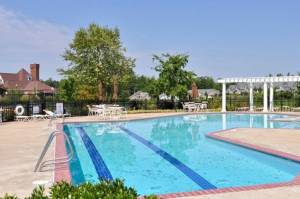Several comments on social media sites bring up the point, how does the person know where they got COVID from? How can it be proved? Several have asked is it just a way to offset the growing number of past due HOA fees due to the economy? Residents have since taken to social media to debate the issue and try to connect with their HOAs. Most of the responses feel it should be up to the residents. Residents should be responsible for cleaning prior to using a chair, or just simply don’t go if you don’t feel safe.
With travel more difficult and the economy not back to pre COVID days, many families we talked to will be staying home, and now cannot use the pool.
Many do not understand how the playgrounds and tennis courts can open. There appears to be lots of unanswered questions and some very frustrated residents.
Kilian Fisher is IHRSA’s International Public Policy advisor and has extensive experience operating pools and spas in the U.K. and Ireland. He also led the development of National Guidelines and Training in both the U.K. and Ireland. Paul Hackett is a Chartered Safety & Health Practitioner and OSHCR Registered Consultant. He has the following information
Pool Safety
A well-run, clean swimming pool with appropriately treated water using chlorine at internationally accepted levels should provide adequate disinfection to neutralize the SARS-CoV-2 virus, which causes the COVID-19 disease.
Operators should ensure chlorine levels in pools and spas are kept between 1-3mg/l with the pH between 6.8-7.4. Spa pools that use bromine need to maintain their water at 4-6mg/l bromine or 3-5mg/l chlorine. Routine tests for microbiological quality should also be undertaken in line with national guidelines.
Given that the virus is a new one, experts cannot say with absolute certainty that it will be safe. However, most authorities believe that pool and spa waters that are adequately disinfected should not spread the disease. A bigger risk will be the face-to-face interaction between individual users of the pools and spas.
Continue following all the regular advice about not shaking hands and coughing/sneezing into a tissue and disposing of it immediately.
Operators will need to maintain diligent hygiene standards in changing areas, toilets, and showers. Operators need to ensure pool water standards are at their best by regular water testing and taking actions if they are not in acceptable norms.
Here are some other best practices when it comes to pool safety:
- Swimmers and spa users who feel unwell should not use public facilities and under no circumstances spit or blow their noses in the water.
- Swimmers and spa users should wash their hands with soap and water often. Do this for at least 20 seconds.
- Everyone should wash their hands when entering the facility. Use hand sanitizer gel if soap and water are not available. Health authorities recommend solutions with 60% alcohol or more.
- Everyone should cover their mouth and nose with a tissue or elbow (not their hands) when they cough or sneeze.
- Put used tissues in the bin straight away and wash your hands afterward.
- Try to avoid close contact with people who are unwell.
On May 29, 2020 the CDC announced information on swimming pools. You can find this information by going to https://www.cdc.gov/coronavirus/2019-ncov/community/parks-rec/aquatic-venues.html
How do you feel about this? If you reside in a neighborhood with a pool, is your pool open or closed?
If opened what has changed? Let use know by writing to [email protected]



